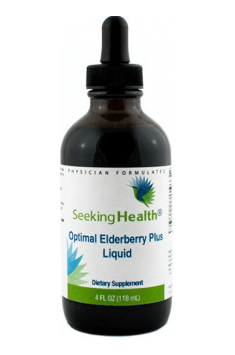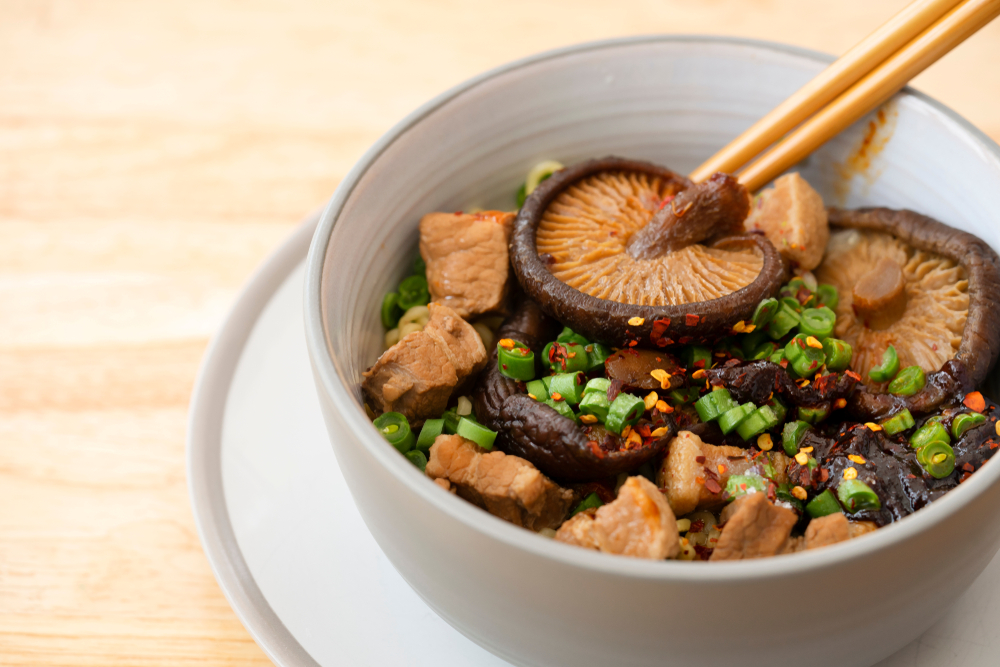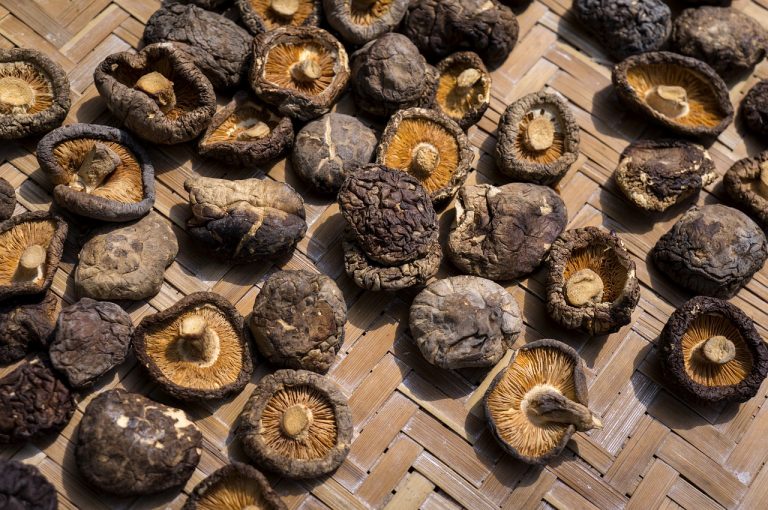Shiitake mushrooms have been used for ages in the cuisine and medicine of the Far East, in such countries as Japan or China (both raw and dried!). They contain a lot of rare B-group vitamins and vitamin D. However, their main health advantage is the improvement of the functions of the immune system, shiitake may also help to decrease the level of cholesterol, fight obesity and even inhibit the growth of cancer cells.
Shiitake mushrooms - origin
Shiitake mushrooms profoundly grow on the trunks of such trees as oak, chestnut, maple or on the Japanese tree shii (this is the tree from which the name of these mushrooms comes from). It is a very popular additive in oriental cuisine and also an invaluable source of health benefits (1).
Shiitake mushrooms gained popularity as a medicine during the reign of he Ming Dynasty. It was believed that the brew from these mushrooms alleviates pain, the symptoms of fatigue and reduces the problems related to the organism’s aging. It was also believed that it supports the health of the heart and is effective in the fight with lung diseases and parasites of the digestive system. It has also become an important element of cancer treatment. (2)
Shiitake mushrooms are one of five most popular mushrooms cultivated in the world. They are light-brown, have smoke-like taste and are mainly used to prepare Asian dishes, such as pad thai and miso soups. Shiitake mushrooms is a powerhouse of nutrients and it is able to treat many diseases.
Nutritional facts and medical application
When served raw or dried - shiitake mushrooms in every form offer a multitude of nutritious substances.
- They are a good source of B-group vitamins, such as B1 , B12 and also provitamin D2.
- In the raw form, they are composed in 88-99 percent of water and the supply of 88-92 percent of proteins, lipids, carbohydrates and also vitamins and minerals.
- Dried shiitake are rich in carbohydrates and proteins.
- They contain 58-60 percent of carbohydrates, 20-23 percent of protein, 9-10 percent of fiber, and 3-4 percent of fat (3)
Shiitake mushrooms help to increase immunity of the organism and are used in medicine to treat diseases which impair the immune functions, such as AIDS, various types of cancer and allergies, infections and inflammations, heart diseases, hyperlipidemia (including high level of cholesterol in blood), hypertension, diabetes and liver inflammation. It was also proven that they are very effective in regulating urinary incontinence.
Moreover, shiitake are rich in compounds with proven pharmacological properties, such as polysaccharide lentinan used in a few well-researched medical preparations. Some substances, such as lentinan, lectins and eritadenine are antibiotics and have anticancer and antiviral properties. They are also widely used in the pharmaceutical field (4).
Health benefits of Shiitake mushrooms
Below you will find a few benefits that may be felt after introducing shiitake mushrooms to your diet.
Decreased cholesterol
Eritadenine, the compounds in Shiitake mushrooms, decreases the level of cholesterol by ca. 5-10 percent after the application of the mushrooms. An important role is also played by another compounds, chitin, which constitutes 80% of fiber in the mushrooms (5).
Regular consumption of shiitake mushrooms is a good idea in order to decrease the level of cholesterol in blood. In the study carried out in order to evaluate the effectiveness of Shiitake mushrooms in decreasing the level of cholesterol, rats were administered fiber from maitake and shiitake for 4 weeks. The excretion of cholesterol with feces on a diet rich in the above mentioned fiber was higher in rats, which were administered cellulose powder. (6)
Helps in fight with obesity

Shiitake mushrooms are considered very effective in fighting with the excess of adipose tissue in the organism. It was confirmed in the study carried out on rats in order to test the influence of shiitake mushrooms on the lipid profile in the plasma, settling of fat, energy effectiveness and adipose tissue. In case of high-fat diet, it was proven that in case of the proper supply of shiitake mushrooms they may prevent the increase of body mass and settling of fat.(7)
Boost for the immune system
If you often get sick, adding shiitake mushrooms to your diet will help you boost your immunity. A study from 2015, published in the American College of Nutrition evaluated the condition of 52 healthy men and women aged 21-41 in order to understand if shiitake mushrooms may iprove the function of the immune system. At the end of the study it was concluded that daily application of the mushrooms increased immunity in a condierable way(8).
Cancer prevention
It is believed that many types of mushrooms have the ability to prevent and treat cancer and have been used in traditional treatments for centuries. It is also believed that shiitake mushrooms have the properties that fight cancer. It mainly results from the presence of the sugar compound called lentinan which is a beta-glucan (9). Beta-glucans have the ability to stimulate the immune system and cause that some cells and proteins in the organism attack cancer cells. (10)
Support of the health of the cardiovascular system
Shiitake mushrooms have been used in Japan for centuries in order to decrease the level of cholesterol and strengthen the heart. Studies proved that shiitake mushrooms decrease the level of VLDL cholesterol, which contains the highest amount of triglycerides as well as HDL or “bad” cholesterol, which may positively strengthen the functioning of the heart. (11)
Microbicidal effect
It was proven in many studies that shiitake mushrooms have antibacterial and antifungal effect, which makes them useful in the fight with many infections. When a water extract of the mushrooms was studied, they demonstrated antibacterial activity towards 85% of the studied microorganisms, including 50% of yeasts and various kinds of mold. (12) Mushrooms such as shiitake are incredibly useful during the time when antibiotics are commonly used, which makes people resistant to them.
Perfect source of vitamin D
Deficiency of vitamin D is common, especially in the winter months, when the exposure to sun is hard. It is important to complement our diet in food which may provide this vitamin. Sun-ripened mushrooms are a perfect source of vitamin D, as they contain high concentrations of vitamin D precursor - provitamin D2.
The advantage of shiitake mushrooms is the fact that they produce not only vitamin D2, but also D3 (produced in skin) and D4. (1)3
Are there any side effects?
Shiitake mushrooms are a less-known allergen and may cause shiitake eczema, a specific type of skin allergy. Allergic reaction in the form of pimples was noticed within 12 hours to 5 days after the application of raw or partially boiled mushrooms. The consumption of shiitake mushrooms also caused the appearance of asthma in some cases.
In the study carried out on ten healthy people, the application of the powder from shiitake mushrooms caused increased gastric problems and eosinophilia in five people. The application of the mushrooms may also cause headaches, nausea, stomachaches or lowered blood pressure.

Can we eat raw shiitake mushrooms?
Raw mushrooms are eaten by people all around the world. Unfortunately, there is a higher risk of allergic reactions in relation to this. If you are worried that mushrooms will lose their nutritional values during boiling, try a dried version.
How to store shiitake mushrooms?
Below you will find the best ways of safe storage of shiitake mushrooms:
The best method is storing them in the fridge. You should put them in the fridge within one hour from gathering to prevent the loss of nutrients. Shiitake mushrooms will preserve freshness if they are stored in a cold, dry and dark place.
In order to prolong freshness, the mushrooms may be steamed or fried. Dip them in water with lemon (one teaspoon of lemon juice per half a liter of water) for ca. 5 minutes. Then steam them for 3-5 minutes, depending on their size and then put them aside for cooling. When they are cool, we need to dry them before placing in the fridge.
Slightly closed paper bag is perfect for storing the mushrooms. Fried fruit may be stored in a closed package in the freezer or fridge up to 6 months.
How to recognize the mushrooms are off?
Do your mushrooms have more than 2 weeks? Are they greasy, smell bad and have brown spots? Are the gills more brown than they were at the moment of purchase? If the answer to all these questions is yes, this means that your fungi are off. Do not eat them! Always use fresh mushrooms.
A great alternative to these mushrooms which are poorly available in our country is the extract from the company Seeking Health. This is the highest-quality alcohol-water extract from shiitake mushrooms and other pro-health substances.
______________________________________________________________________________________________________________________________






